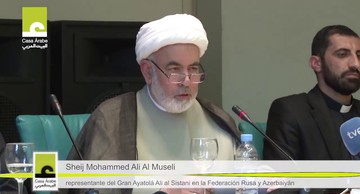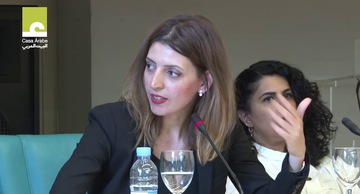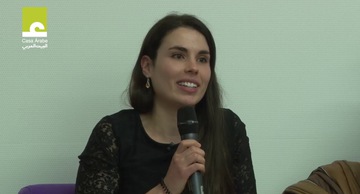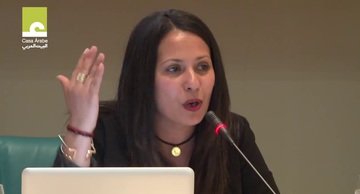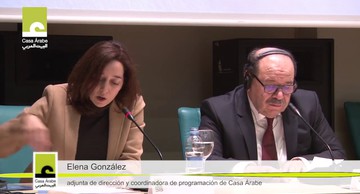

Gender Politics in Tunisia and Libya (Arabic)
نشرت 09 مارس 2021
ALL VIDEOS IN THIS CATEGORY
-
Challenges for Iraq after the defeat of Daesh (ARABIC)
04.26.2018. Members of the Shia, Sunni and Christian faiths in Iraq took part in this conference, organized by Casa Árabe, the Embassy of Iraq in Spain and the Alulbeyt Spain Foundation. The official proclamation of victory against the self-named Islamic State (Daesh), achieved by Iraq’s government in December 2017, has opened up a new era for the country. In 2014, Daesh controlled one-third of Iraq’s territory, almost a third of Syria and had reached as far as just a few kilometers from Baghdad. However, thanks to the cooperation between various local forces and the Iraqi Army, the lost terrain was recovered, bringing the end to a situation that seemed to be driving a strategic region of the world towards disaster. It is best not to become too triumphalist, though, because the region is still mired in profound instability, and there are still major challenges in reconstruction faced by the country in order to achieve long-term stability and complete the reconstruction process. This conference brought together Iraqis of the Shia, Sunni and Christian faiths to analyze the country’s current state of affairs. Taking part in the event were Sheikh Mohammed Ali Al Museli, representative of the Great Ayatollah Ali al Sistani in the Russian Federation and Azerbaijan; Dr. Khalid Al Mulla, a researcher on social and religious subjects and the president of the Centrism and Moderation Foundation, and Father Naim Ayoub Shoshandy, a former parish vicar at the Cathedral of Qaraqosh. The event was moderated by Yusuf Fernández, an Arabist and member of the Alulbeyt Foundation. It was presented by Pedro Martínez-Avial, the General Director of Casa Árabe. More info: http://en.casaarabe.es/event/challenges-for-iraq-after-the-defeat-of-daeshنشرت 04 يونيو 2018 -
Women’s struggle for socio-political participation in the Arab world
05.08.2018. Within the framework of the seminar Women’s leadership and participation in Arab countries, Casa Árabe organized this conference, in which three experts analyze the situation for women in the region. Two months after International Women’s Day, it is now a good time to stop and take a look at the situation in Arab countries. The social changes over the last decade in many of the MENA region’s countries may be seen from different vantage points, ranging from inequality in gaining access, sectarianism and gender-related violence to positive indicators of political participation through the media, art, urban mobilizations and even the polls at election time. The way in which women have lived these changes merits a space for sharing experiences, whether in terms of marginalization or empowerment, and thus for analyzing the degree of participation by women in the socio-political arena. The conference included talks by Manal Al Dowayan, an independent Saudi artist; Faten Kallel, former State Secretary of Tunisia’s Ministry of Youth and Sports, and Nada Nashat, defense coordinator at the Center for Legal Assistance of Egyptian Women (CEWLA). Moderated by: Karim Hauser, from Casa Árabe. The conference was held as part of the seminar Women’s leadership and participation in Arab countries, which also included the participation of Reem Khalifa, an independent journalist from Bahrain, and Rauda Morcos, a Palestinian activist for LGBT rights. More info: http://en.casaarabe.es/event/women’s-struggle-for-socio-political-participation-in-the-arab-worldنشرت 04 يونيو 2018 -
Syria: The impossible revolution (ARABIC)
04.17.2018. Syrian political opposition leader Yassin Al-Haj Saleh presented his work at the Casa Árabe headquarters in Madrid. This is a compilation of texts which the author has been publishing since the beginning of the insurrection in his country. Along with the author, the event included speeches by Santiago Alba Rico, a Spanish writer, essayist and philosopher, and Naomí Ramírez Díaz, the book’s translator and publisher. The event was presented by Karim Hauser, Casa Árabe’s International Politics Coordinator. The work which we are presenting, published by Ediciones del Oriente y del Mediterráneo, is a compilation of texts which Yassin Al-Haj has written since the insurrection in Syria, when that process began on March 15, 2011. Though not well-known in Spain, Yassin Al-Haj is one of the most important intellectuals among Syrian dissidents. “Someone might think that this book talks about Syria and its defeated revolution, about the Assad dictatorship and the Near East, about imperialism and the Kurdish question (Chapters 10, 11 and 13 are quite interesting and controversial), on Jihadism and violence. But it is more than that. This book speaks about us all. One of the theories that Al-Haj Saleh has upheld in recent years is that Syria reveals and represents a universal destiny, and therefore it is impossible to think about Syria, and even less so about the globalized world, without thinking about our common fate. This is why every time we produce a discourse to forget, negate or avoid Syria, we are really just doing damage to ourselves.” Santiago Alba Rico Yassin Al-Haj Saleh spent sixteen years in jail for his Communist militancy. Since the year 2000, after finishing his studies in Medicine, which he was forced to give up because he was imprisoned, he has been writing a book of stories about his experience in jail, as well as The Syrian Question, published in France by Sindbad-Actes Sud. He regularly contributes articles to the newspapers Al-Hayat, Al-Quds al-Arabi and Al-Jumhuriya. In 2012, he was granted the Prince Claus Award of the Dutch Ministry of Foreign Affairs for the social impact of his writings, though he was unable to collect the award since he was living underground in Damascus. He is currently an associate researcher at the Wissenschaftskolleg in Berlin. His wife, Samira Khalil, the author of Diary of the Siege on Douma in 2013, has been missing since she was kidnapped in December of 2013, along with Razan Zaituneh, Wael Hammada and Nazem Hamadi. More info: http://en.casaarabe.es/event/syria-the-impossible-revolutionنشرت 24 ابريل 2018 -
The Circus in Morocco: Past, present and future of an evolving ancestral art (FRENCH)
2018.21.03. Casa Árabe and Circo Price organized this conference, on the occasion of the visit by the Groupe Acrobatique de Tanger. The conference was given by Sanae El Kaamouni, director of the Groupe Acrobatique de Tanger, who was accompanied by María Folguera, the director of Circo Price. Born from a warrior tradition, acrobatics in Morocco is a pure science of the circus that combines human pyramids, spins and jumps. The Moroccan acrobats who belonged to the order of Sidi Ahmed Ou Moussa learned their art in the public squares of towns and villages, and on the beach in Tangiers, alongside their elders, who became teachers. The circle of Halka, like the evenings in trance, carry out the same function held in European antiquity by Carnivals. The free-flowing energy in the moving body does away with the hierarchy of classes and the imposed sociocultural order for a few hours. This motion replenishes, soothes the ego, lowers one’s defensiveness and releases individuals. In this dual dialectic which characterizes them –including both tradition and contemporary creation, from both Morocco (in African lands) and France (in Europe)–, the Groupe Acrobatique de Tanger places us face-to-face with the extraordinary subjects of today’s world, forming part of one of the most innovative border territories in our region’s current circus scene. Sanae El Kaamouni, director of the Groupe Acrobatique de Tanger, shared a tour through the history of acrobatics in Morocco with the audience in Madrid: from the warrior pyramids of the fifteenth century to today’s flourishing Moroccan circus art, including the contact between European circuses and acrobats from the Maghreb region in the mid-nineteenth century. It is a fascinating story for the curious and lovers of knowledge and travel, showing the circus as a kaleidoscope of cultures, images and origins. The Groupe Acrobatique de Tanger was presenting the show “Halka” on the dates of April 4 and 5 at the Teatro Circo Price in Madrid. Tickets now being sold on the Circo Price website. More info: http://en.casaarabe.es/event/the-circus-in-morocco-past-present-and-future-of-an-evolving-ancestral-artنشرت 12 ابريل 2018 -
Islam and the Universally Shared: Co-existing identities and religions (ARABIC)
02.12.2018. Abdallah Boussouf, Secretary General of the Council of the Moroccan Community Abroad (CCME) and author of this work, presented this book at Casa Árabe’s headquarters in Madrid. The event was presented by Elena González, Casa Árabe. In the book, Abdallah Boussouf uses a series of essays with a historical perspective to recover the essential values of Islam from its very origins, placing the emphasis on ideological and religious pluralism, and intercultural co-existence, typical of societies where Islam predominates. The principles of co-existence and tolerance of diversity comprise an Islamic legacy which is especially important to highlight in our day, as a counterpoint to the widespread portrayal of Islam associated with violence and the prejudices which have led to commonplace Islamophobia. In “El islam y el común universal” (“Islam and the Universally Shared,” published by Ediciones Panteón, 2017 in France, and by Diwan 2018 in Spain), Boussouf defends moderate Islam, tolerance and peaceful religious co-existence. The book’s author is also the Secretary General of the Council of the Moroccan Community Abroad (CCME) and a historian whose doctoral thesis focused on relations in the Mediterranean Basin in the thirteenth century. He was a European Commission expert in the program “A Soul for Europe” (1997-2003). He presided over the commission to form the French Council for Muslim Worship (CFCM) and was elected Vice-President of that council in 2005. He was a founder of the Euro-Islamic Center for Culture and Dialogue, with headquarters in Charleroi, Belgium. The Council of the Moroccan Community Abroad (CCME) is an institution for consultation and prospecting with administrative and financial independence that is responsible for drafting reports and studies on migration in general and Moroccan immigration around the world in particular. It is also responsible for tracking and evaluating the Kingdom’s policies to adapt them better to the needs of the Moroccan diaspora, thereby ensuring their rights while making it possible for them to take part in the country’s political, economic, cultural and social development. More info: http://en.casaarabe.es/event/islam-and-the-universally-shared-co-existing-identities-and-religionsنشرت 23 فبراير 2018

